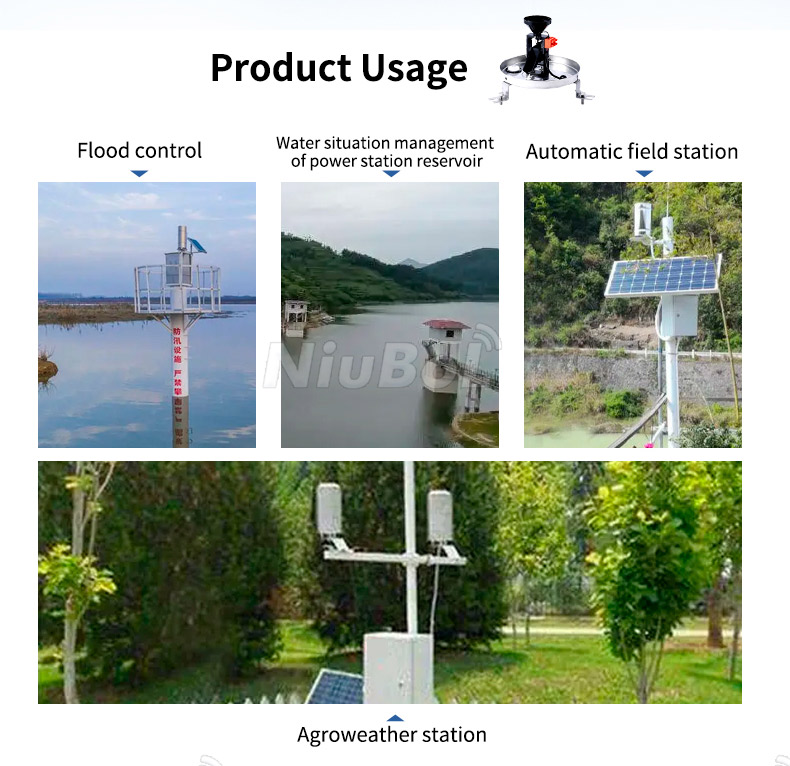

— Blogs —
—Products—
 Consumer hotline +8618073152920
Consumer hotline +8618073152920 WhatsApp:+8615367865107
Address:Room 102, District D, Houhu Industrial Park, Yuelu District, Changsha City, Hunan Province, China
Product knowledge
Time:2025-01-11 17:42:46 Popularity:194
In the context of increasingly severe climate change, accurate and real-time meteorological data has become crucial for environmental monitoring, disaster warning and water resource management. As an important part of modern meteorological observation, the rainfall monitoring station not only collects real-time rainfall data, but also monitors key meteorological parameters such as wind speed, wind direction, temperature and humidity, and atmospheric pressure, making it a powerful assistant in the field of meteorological observation and environmental monitoring.
The core advantage of the rainfall monitoring station lies in its integrated high-precision sensors (rainfall sensor, wind speed sensor, wind direction sensor, temperature and humidity sensor, and atmospheric pressure sensor). These sensors are able to record rainfall in real time and accurately, guaranteeing the reliability and accuracy of the data. Through the built-in data acquisition system, the rainfall monitoring station converts the monitored rainfall into digital signals and stores them for subsequent data analysis and processing. These data are of vital importance for assessing water resource conditions, predicting flood disasters, and formulating irrigation plans, etc. Especially in areas where droughts and floods are frequent, timely precipitation data can undoubtedly provide important support for disaster prevention and mitigation efforts.
Many outdoor rainfall monitoring stations in the field, especially in remote areas far from utility power supply, have adopted solar power supply systems. As a clean, renewable energy source, solar energy not only reduces the operating costs of the equipment and pollution to the environment, but also equipped with built-in wide-temperature colloidal maintenance-free batteries, which are able to maintain stable performance under extreme temperature conditions, ensuring that the equipment can still continue to work in bad weather. This self-sufficient energy supply not only ensures the long-term stable operation of the equipment and reduces the dependence on external power, but also significantly improves the reliability and service life of the equipment.
The design of the outdoor rainfall monitoring station takes into full consideration the complexity of the field environment, especially the adaptability to severe weather such as rain, wind and snow. In order to ensure the stable operation of the equipment under the attack of various natural factors, the rainfall monitoring station adopts a high-strength pole mounting bracket. This kind of mounting frame is not only stable and reliable, but also can effectively resist the influence of natural environment such as high wind, heavy rain and snowfall, etc. It also ensures the safety and stability of the equipment. In addition, the installation and maintenance of the equipment is also very easy, reducing the risk of damage caused by environmental factors.
Rainfall monitoring stations are not only important in the field of meteorology, but also widely involved in environmental monitoring, agricultural irrigation, water resource management and other fields. Accurate precipitation data can not only provide a basis for agricultural production, help to formulate a reasonable irrigation plan, but also provide support for the rational allocation and management of water resources. Based on rainfall monitoring data, natural disasters such as floods can also be predicted and early warning, providing a scientific basis for disaster prevention and emergency response.
With the continuous progress of technology, the application areas of rainfall monitoring stations are also expanding. In the future, rainfall monitoring stations will be more intelligent, able to combine artificial intelligence, big data analysis and other technologies to provide more comprehensive and accurate meteorological data, further improving the efficiency and accuracy of meteorological observation and environmental monitoring.
With the integration of IoT technology, the rainfall monitoring station not only realizes automatic data collection and storage, but also enables real-time data uploading to the cloud platform through wireless transmission technology. Users, no matter where they are, can obtain first-hand meteorological information through intelligent devices and realize remote monitoring and analysis, which greatly improves monitoring efficiency and response speed. This intelligent and remote monitoring capability makes the rainfall monitoring station play an increasingly important role in responding to climate change, safeguarding public safety and promoting sustainable agricultural development.

With its high-precision data collection, solar-powered green energy solution, and reliable design, the outdoor rainfall monitoring station has become an important tool for modern environmental monitoring and meteorological observation. It can not only provide important data support for water resource management, disaster early warning, agricultural production and other fields, but also be able to operate stably under the conditions of no utility power supply, which makes it an ideal choice for field monitoring work. With the continuous progress of technology, the rainfall monitoring station will play a wide and far-reaching influence in more fields, and make important contributions to global meteorological monitoring and environmental protection.
Related recommendations
Sensors & Weather Stations Catalog
Agriculture Sensors and Weather Stations Catalog-NiuBoL.pdf
Weather Stations Catalog-NiuBoL.pdf
Related products
 Combined air temperature and relative humidity sensor
Combined air temperature and relative humidity sensor Soil Moisture Temperature sensor for irrigation
Soil Moisture Temperature sensor for irrigation Soil pH sensor RS485 soil Testing instrument soil ph meter for agriculture
Soil pH sensor RS485 soil Testing instrument soil ph meter for agriculture Wind Speed sensor Output Modbus/RS485/Analog/0-5V/4-20mA
Wind Speed sensor Output Modbus/RS485/Analog/0-5V/4-20mA Tipping bucket rain gauge for weather monitoring auto rainfall sensor RS485/Outdoor/stainless steel
Tipping bucket rain gauge for weather monitoring auto rainfall sensor RS485/Outdoor/stainless steel Pyranometer Solar Radiation Sensor 4-20mA/RS485
Pyranometer Solar Radiation Sensor 4-20mA/RS485
Screenshot, WhatsApp to identify the QR code
WhatsApp number:+8615367865107
(Click on WhatsApp to copy and add friends)